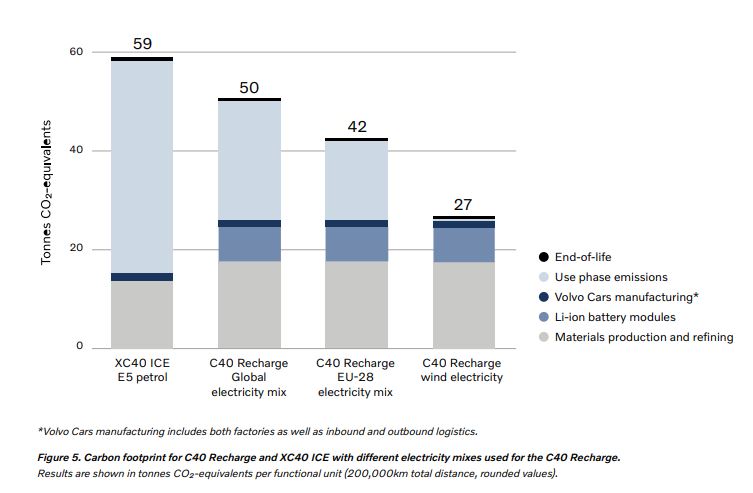Production gives significantly more CO2 emissions, but after that the EV quickly wins
A frequently heard argument against the switch to electric cars is that they are not better for our planet at all. The production of batteries would put a greater burden on the climate and because we all drive on coal energy, it wouldn’t make a difference whether you drive electric or on petrol. Volvo decided to thoroughly investigate those claims by looking at the total CO2 emissions of the XC40 and C40, from production to use and then even to dismantling. So, is an electric car better for the climate?
Battery production leads to more emissions
Volvo currently sells a petrol car and an electric car on the same platform, which makes it easy to compare the two. They keep the XC40 with petrol engine next to the C40 with all-electric powertrain. As expected, building the battery car produces considerably more greenhouse gas. The production of a Volvo C40 including the battery has a 70 percent greater CO2 footprint than a petrol XC40. Not only does the battery cause more emissions, the C40 uses more aluminum in the construction of the car.
The CO2 emissions of an electric car
Although the electric Volvo starts with a lag, the car reduces CO2 emissions in the use phase of its life cycle. In this case, Volvo calculates with 200,000 kilometers before the car goes to scrap. Of course the car can drive more, but this is a calculation example. A petrol-powered Volvo has emitted a total of 59 tons of CO2 after manufacturing, driving that distance and dismantling. An electric C40 produces 50 tons of CO2, if the global average composition of green and gray electricity is taken into account. In Europe, the energy mix is somewhat greener and the C40 would have emitted 42 tons of CO2 from production to dismantling.

If you connect the C40 to wind energy for its entire life, the car will emit 27 tons of CO2 over its entire life. That’s still not zero, as some people expect from an electric car, but it’s almost half of what an XC40 on E5 petrol emits. With 18 tons of CO2, the production of the electric C40 remains the most taxing part of the entire life cycle. With the petrol car that is 43 tons burning fuel.
So, is an electric car better for the climate?
Do you want to buy a new Volvo XC40 or C40 and plan to drive only 77,000 kilometers before taking it to the scrapyard? Then you better get a petrol version. The turning point for the C40 in Europe is at that mileage. But if you drive the C40 on completely green electricity, it is better for Mother Nature from 49,000 kilometers than the petrol version. The global turning point, if you look at the average composition of green and gray energy, is 110,000 kilometers.

























